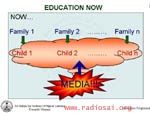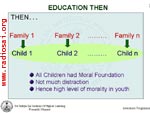|
MODERN EDUCATION: THE MALADY AND THE
REMEDY
Recently, there was a Conference of Vice Chancellors held
in Prashanti Nilayam. This issue carries a detailed report
on that. Relating to that, I would like to presently muse
on where education has drifted today where India is concerned.
By the way, I should mention that this Conference was a part
of the year-long, Golden Jubilee Celebration of the University
Grants Commission. This particular Conference was to deal
with the question of values, and what better place to hold
it than Prashanti Nilayam?
 Let
me start by comparing today's situation in education with
that which was obtained in 1947, at the time of Independence.
If we do that, we sure find many pluses. The budget for education
has increased enormously, the number of schools and colleges
has grown phenomenally, so has enrolment, and funding for
research which, while it could be better, is not to be sneered
at. In fact, it is all these facts put together that has enabled
the country to make good progress in Science and Technology,
as compared to many other developing countries that won freedom
around the same time. Nevertheless, the overall score is somewhat
disappointing because today's students are not quite what
they should be. No doubt they are very intelligent, they are
quick on the uptake, they can solve problems in a jiffy, and
many of them are even whiz kids. But all of this does not
add up to what this country needs at the present time, and
needs badly I might add. Let
me start by comparing today's situation in education with
that which was obtained in 1947, at the time of Independence.
If we do that, we sure find many pluses. The budget for education
has increased enormously, the number of schools and colleges
has grown phenomenally, so has enrolment, and funding for
research which, while it could be better, is not to be sneered
at. In fact, it is all these facts put together that has enabled
the country to make good progress in Science and Technology,
as compared to many other developing countries that won freedom
around the same time. Nevertheless, the overall score is somewhat
disappointing because today's students are not quite what
they should be. No doubt they are very intelligent, they are
quick on the uptake, they can solve problems in a jiffy, and
many of them are even whiz kids. But all of this does not
add up to what this country needs at the present time, and
needs badly I might add.
What has gone wrong? Well, I believe that the root cause
of the problem is the large- scale abandoning of  values
by schools and colleges. They are no longer bothered about
character-development which really ought to be their priority
number one. Instead, most of them are busy trying to make
money, try to be one up over other schools and in teaching
ruthless competition to students. In other words, values that
have been cherished so dearly and which have held this Society
for thousands of years have been jettisoned altogether in
a few short decades. values
by schools and colleges. They are no longer bothered about
character-development which really ought to be their priority
number one. Instead, most of them are busy trying to make
money, try to be one up over other schools and in teaching
ruthless competition to students. In other words, values that
have been cherished so dearly and which have held this Society
for thousands of years have been jettisoned altogether in
a few short decades.
I recall what it was like barely sixty years
ago. Children were given a good moral upbringing at home,
there was morality in the school and in college, and in the
work place too. There was, so to say, a general moral ambience.
As a result, when young people came together, they brought
with them their individual moral armour, toughened at home
and in school. Thus young people had no difficulty in adhering
to the moral path. Today, all that has more or else disappeared,
thanks to two major factors. Firstly, parents have no time
for their children while teachers couldn't care less about
character development. Secondly there is the pernicious effect
of the Media, fuelled by money power. The net result is that
large numbers of even good people have begun to think that
Sathya and Dharma will
not work anymore. Is this really true? Let us examine.
Let us ask first: "What really is expected of an educated
person?" People may say: "Such a person would be
good at solving problems and in delivering the goods."
I would say not enough. To me the foremost duty of an educated
person is to serve as a Conscience-keeper of Society. And
one cannot be a Conscience-keeper, unless one follows one's
Conscience. All of which means that the prime goal of education
must be to develop character.
You do not have to take my word for it. Just go back to the
Mahabharatha and examine what the great Bhishma, Dronacharya
and Kripacharya did at a crucial moment. They all remained
silent when they ought to have spoken strongly. They totally
failed in their role as Conscience-keepers. Of what use then
was their so-called Knowledge?
Today's a very large number of the so-called intellectuals
have abdicated their moral responsibility and are remaining
silent about all kinds of moral delinquency concerning which
they ought to raise a strong protest. In fact, many of them
are even deluded by the views promoted by the influential
people in association with the media.
Let me at this point recall an incident that
occurred many years ago. It was the month of March, and Swami
was in Brindavan. I was teaching there at that time. One evening
after Bhajans, during the usual Trayee Session, Swami got
the ball rolling with His usual question: Emi
Samacharam, or what news? One
elder said, "Swami, this morning an exciting thing happened.
A Polar Satellite Launch Vehicle [PSLV] rocket was successfully
launched from Sriharkota Launch Station". Swami said,
"Is that so? What will this rocket do?" The elder
replied, "Swami, the PSLV has placed in orbit a remote
sensing satellite. This satellite can remotely monitor forest
fires, urbanisation, deforestation, etc." The gentleman
rattled off a long list but Swami did not seem impressed.
After a while He asked, "Has not Science already made
a lot of progress?" "Yes Swami." "In that
case, why not harness the fruits of these developments first
for the benefit of mankind, before spending more money on
research?"
 That
really is the point, and it is far from trivial. Just to underscore
it, let me draw attention to what has happened to TV in this
country. When it was first introduced in the seventies, it
was stated that TV would be used mostly for educational purposes
and moderately for entertainment. TV is a very powerful medium
and if it had been harnessed for education, it could have
done wonders. Instead, very quickly it was taken over for
money making, almost with no holds barred. And the results
are there for all to see. In fact, Swami refers to TV as Televisham;
visham means poison! The indictment
is indeed strong. That
really is the point, and it is far from trivial. Just to underscore
it, let me draw attention to what has happened to TV in this
country. When it was first introduced in the seventies, it
was stated that TV would be used mostly for educational purposes
and moderately for entertainment. TV is a very powerful medium
and if it had been harnessed for education, it could have
done wonders. Instead, very quickly it was taken over for
money making, almost with no holds barred. And the results
are there for all to see. In fact, Swami refers to TV as Televisham;
visham means poison! The indictment
is indeed strong.
So, what are we to do? Luckily, there is
an answer and, needless to say it is from Swami Himself. The
answer came way back in 1968 when Baba was in Bombay. During
that trip He was invited to the Bharatiya Vidya Bhavan, a
Cultural University in that city. Assembled there were a group
of scholars and intellectuals, and one of them asked: "Should
India go nuclear or not?" This, by the way, was six yeas
before India tested a nuclear device. Swami in reply first
drew attention to the Pandavas. He said that while Bhima was
mighty and Arjuna a skilled archer, both of them bowed before
their elder brother Dharmja. That was because Dharmaja always
adhered to Dharma. Baba continued,
"In today's world, America is like Arjuna while Russia
is like Bhima. India must be like Dharmaja. In practical terms,
India must try to enhance its Moral Power rather than its
military might." Interestingly, this is precisely what
Swami Vivekananda dreamt of earlier - he too wanted India
to be the Moral Leader of the world.
The message is loud and clear - we must do everything we
can to return to a moral way of life. This is a must because
as Gandhi reminded us so often, there is a Moral Law governing
the Universe. We cannot but bow to it.
There is no need to feel diffident about returning to a moral
way of life. All that is necessary is to have confidence in
Moral Power. This is the Power of God and there is no power
in the Universe that can come anywhere near it; but this we
must firmly believe in. If parents and teachers believe in
this, then what seems impossible can be achieved.
There is no need to imagine that returning
to a moral way of life means backing away from modernity.
This is a totally mistaken assumption. One has merely to take
a good look at Swami's School and Colleges, which, by the
way the visiting Vice Chancellors all did. These educational
institutions founded by Bhagavan Baba have all successfully
blended education with educare, thus offering the right mix
of education that would help in making a living and education
that is for life. Aspects of that were highlighted in the
previous issue. Please go back and take a second look. My
musings are about the Indian scene but I am sure that aspects
of what I have said apply to all countries. Do you agree?
Do write and let us know. As always, we can be reached at:
h2h@radiosai.org
Jai Sai Ram.
G.Venkataraman
|